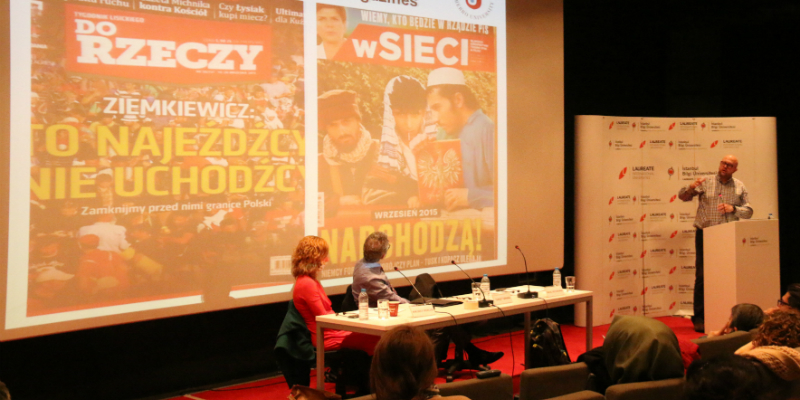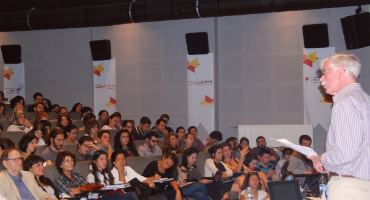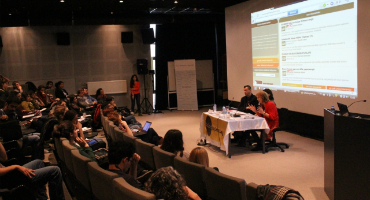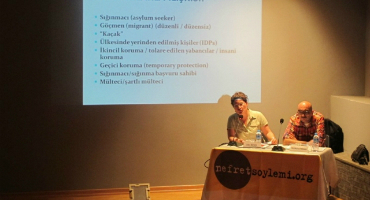The panel on ‘Combating Discriminatory Discourse: Theoretical Discussions & European Experience regarding Hate Speech Laws’ organized by Hrant Dink Foundation, with the support of Friedrich Naumann Foundation took place on 10 November 2015 at İstanbul Bilgi University santralistanbul campus in collaboration with İstanbul Bilgi University Human Rights Law Research Center. The panel’s speakers were Prof. Dr. Michał Krzyżanowski from Media and Communication Studies at Örebro University, Sweden and Asst. Prof. Marloes van Noorlos from the Department of Criminal Law of Tilburg Law School, Holland. The panel was held by the moderation of the director of İstanbul Bilgi University Human Rights Law Research Center Prof. Dr. Turgut Tarhanlı and was broadcasted live. The panel has started by the opening remarks of the head of Friedrich Naumann Foundation Istanbul office, Dr. Hans-Georg Fleck.
The first speaker Prof. Dr. Michał Krzyżanowski’s speech focused on analyzing practices of othering and exclusion in European politics and media. He shared main examples to discuss the discourses in several European countries including Austria, Poland, Sweden and the UK. He also emphasized the dynamics of right wing populist discourses of discrimination and exclusion of migrants and minority groups. He mentioned the necessity to monitor and systematically analyze discursive shifts in both media and political discourse.
The panel continued with the second speaker Asst. Prof. Marloes van Noorloos drawing the distinction between criminal law and human rights law in terms of combating hate speech. In this regard, she draw the attention on the boundaries between freedom of expression and hate speech. After showing some of the main characteristics of European hate speech laws, she went into the theory behind prohibiting hate speech. She ended with a critical note about the use of hate speech laws.
Michał Krzyżanowski is Full Professor and Chair in Media and Communication Studies at Örebro University, Sweden. His research focuses on discourse and communication in the context of political, social and institutional change in contemporary Europe. He has worked widely on the issues of discourse, discrimination and hate speech including from the perspective of new/social and traditional media and European right-wing populism. Michał is Executive Editor of Journal of Language and Politics and co-editor of book series Bloomsbury Advances in Critical Discourse Studies. He also sits on editorial boards of such journals as, inter alia, Critical Discourse Studies and Social Semiotics. He is the author and editor of several major monographs and anthologies in critical discourse research on media, political and organizational communication.
Marloes van Noorloos is assistant professor of criminal law at the Department of Criminal Law of Tilburg Law School. She obtained a Ph.D. degree from Utrecht University in 2011 with her dissertation 'Hate speech revisited. A comparative and historical perspective on hate speech law in the Netherlands and England & Wales' (Intersentia). She has published extensively about ‘hate speech’ and defamation of religion. In her work she combines the perspectives of comparative criminal law, international human rights law, legal theory and the socio-political context behind the law. She is also active in the field of human rights, e.g. as president of the Dutch section of the International Commission of Jurists (NJCM) and board member of NJCM's Public Interest Litigation Project (strategic litigation for human rights in het Netherlands).
Turgut Tarhanlı is a Professor of Public International Law and Human Rights Law and the Director of the BİLGİ Human Rights Law Research Center. He is teaching “International Human Rights Law: Protection Mechanisms”, “Human Rights Activism” and “Business and Human Rights” courses in BİLGİ LL.M. and doctorate programs. He is amongst the founding members of Helsinki Citizens' Assembly, Human Rights Foundation of Turkey, Amnesty International-Turkey, ILI-Istanbul and Istanbul University Law Faculty Alumni Association; and also a member of Transparency International-Turkey, Global Relations Forum and Istanbul Bar Association (1980- ).




